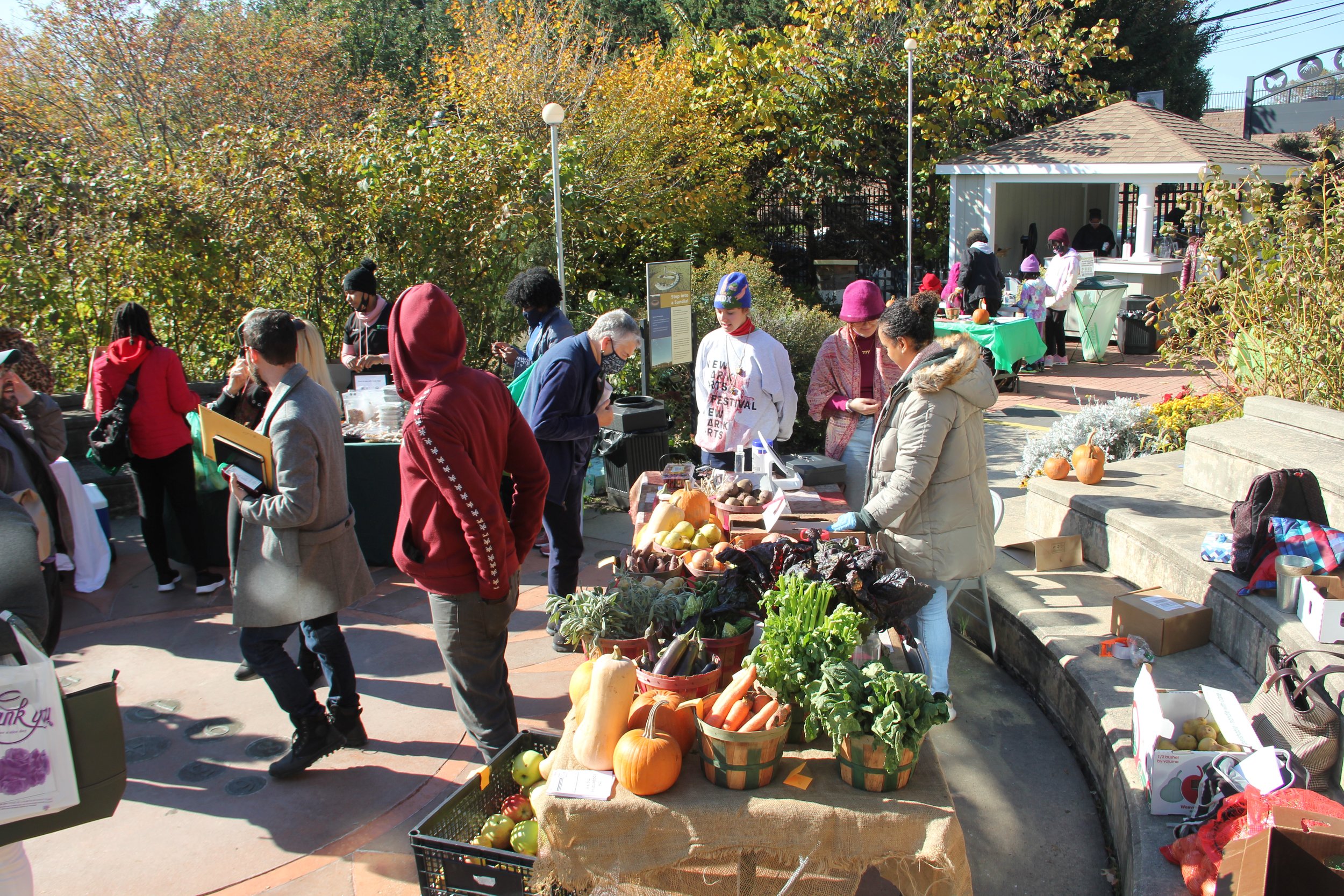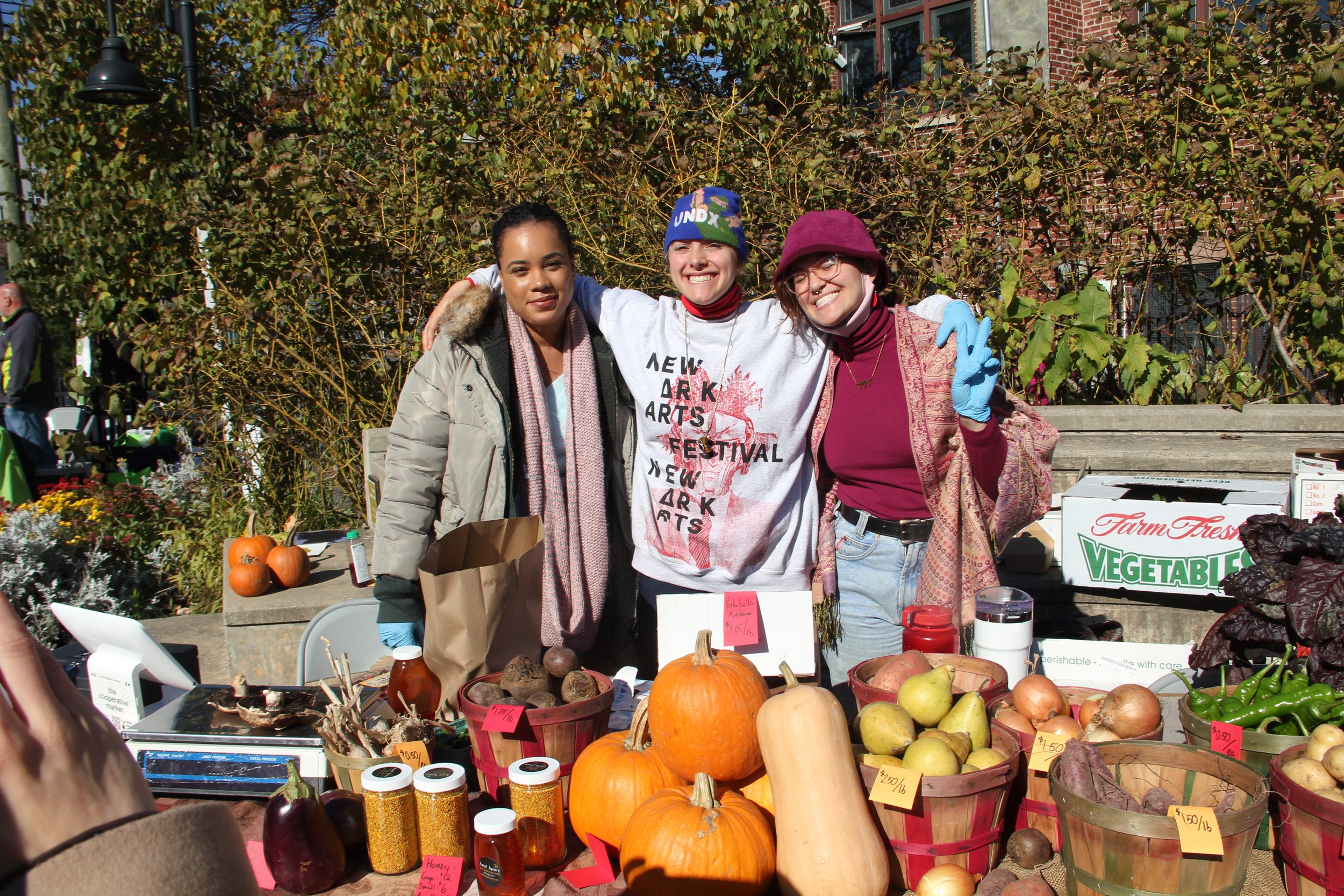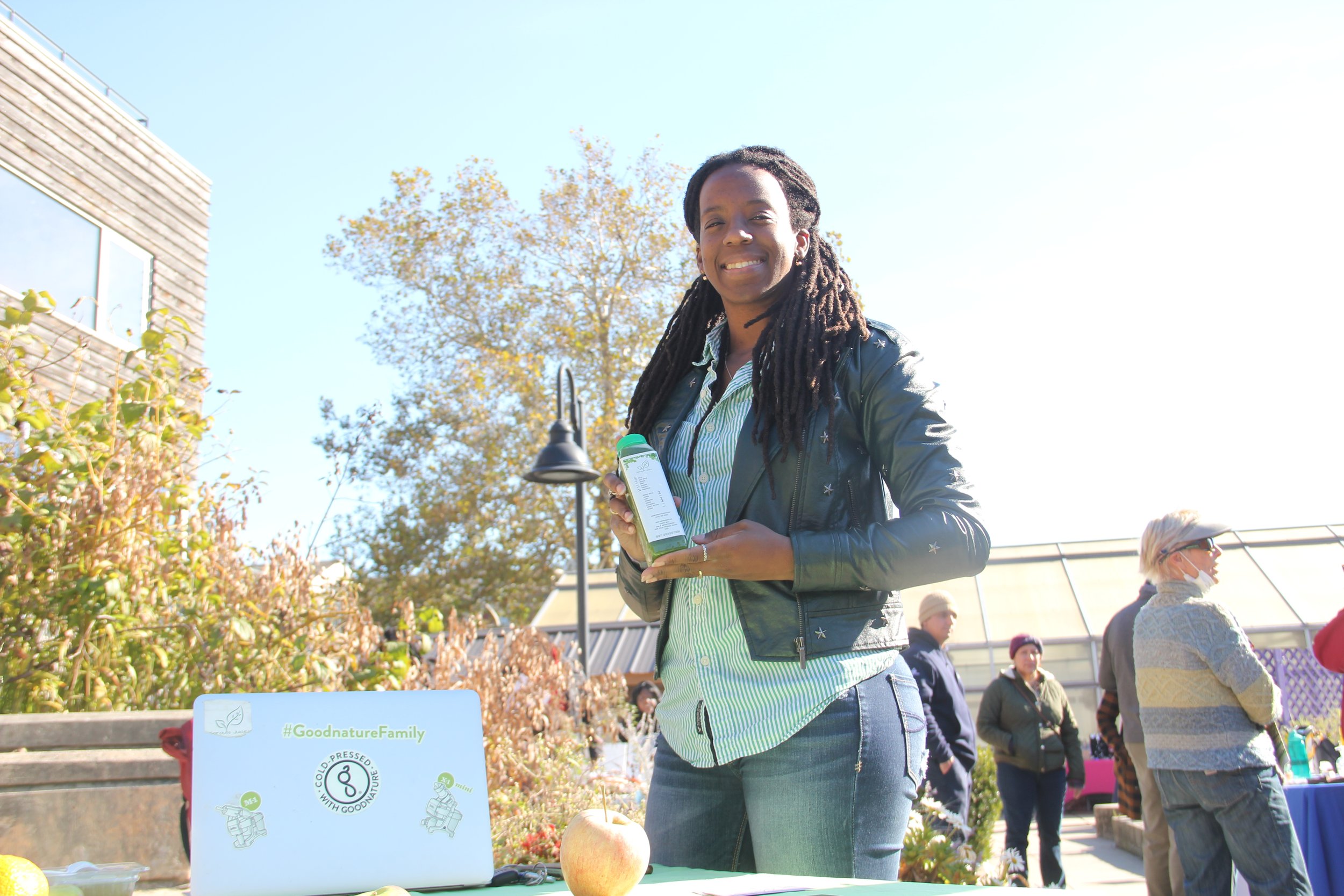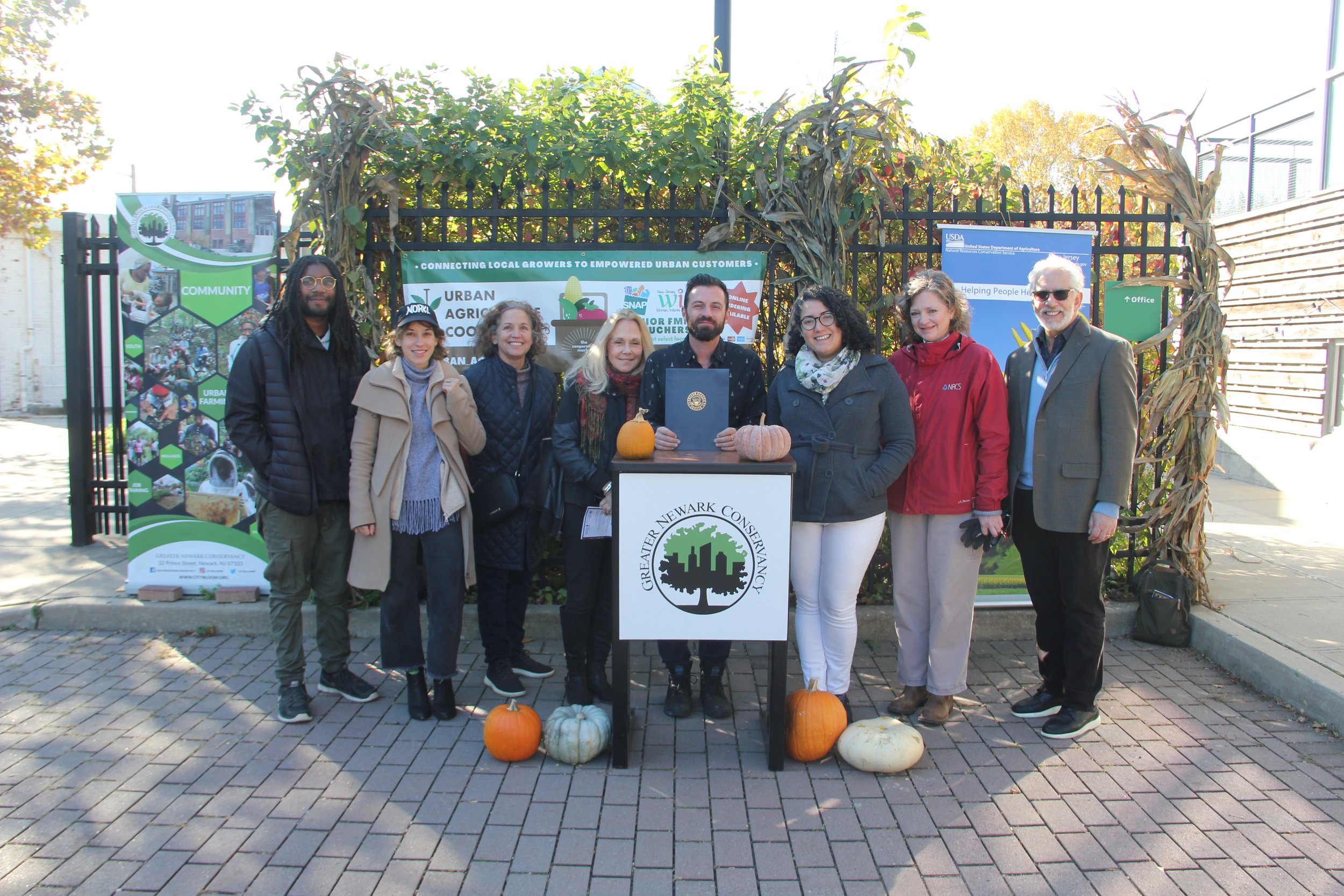USDA grants to help urban farmers in Newark and North Jersey
Urban Agriculture Cooperative vendors and community members interacting at the Urban Agriculture innovation event held at the Greater Newark Conservancy in Newark, NJ on Nov. 6, 2021. (Josie Gonsalves for Public Square)
NEWARK, NJ—Senior citizens, children, and adults still can't afford regular access to food in New Jersey. An estimated 2 million people statewide are food insecure, and 22% of children in Essex county live below the poverty level, according Table to Table a New Jersey food rescue program founded in 1999.
The organization has prevented some 70,000 tons of food from ending up in landfills to date and has stepped up food deliveries in Newark and Essex County. They have since opened a Fresh Produce Market Network serving no to low-income residents in the Ironbound and view food delivery and distribution sites as an effective means of curbing hunger and helping the homeless.
That's one approach. But increasingly, urban farming, which allows community members to harvest their own crops, is emerging in Newark and other cities as a solution to food insecurity and hunger. Not only do urban farms provide access to more nutritious meals, but they also support the livelihoods of local farmers. Urban farms can also help combat climate change by creating local food systems that can reduce energy costs and greenhouse gas emissions associated with food transportation.
Urban farms and the goal of food security
The United States Department of Agriculture (USDA) has announced $355,000 in grants to support urban farming efforts and food security for New Jersey residents via the Northern NJ Small Farm Food Link Conservation Project.
One of the three projects to receive USDA funds as part of a $1.6 million award to New Jersey's Natural Resources Conservation Service (NRCS), the Northern NJ Small Farm Food Link Conservation, is led by the Urban Agriculture Cooperative and "proposes to deliver technical and financial assistance to new and historically underserved urban farmers in Northern NJ, over a 5-year period."
The money is awarded through the NRCS. The organization also received USDA grants to fund the NJ Water Supply's project to protect source water in the Raritan Basin and the New Jersey Audubon's efforts to restore the Salem River as potential habitat for the endangered bog turtle species.
Emilio Panasci (center), founder and executive of the Urban Agriculture Cooperative (UAC) surrounded by members of the Natural Resources Conservation Services (NRCS) on Nov. 6, 2021. (Josie Gonsalves for Public Square)
Emilio Panasci, founder and executive director of the Urban Agriculture Cooperative (UAC) told Public Square that 70% of the dollars would be given out to the farmers. The UAC is the lead partner in this Northern NJ farming project.
"The goal is a huge portion of the grant; actually, 70% of the dollars don't go to our organization," he said. "It gets given out in contracts to farmers to build what are called conservation practices." Such practices include the implementation of seasonal high tunnels, composting facilities, cover crops, and better irrigation systems, all to help promote soil health, water use efficiency, increased production, and lower input costs on the part of urban farmers.
UAC co-founder and program director Jamie Bruno said their network of farmers includes over 30 gardens and farms in Newark. And half of the produce sold at markets is from local suppliers in Essex County. These are the farmers who seek to benefit from this grant. Most of them grow vegetables, herbs, and fruits on vacant lots, rooftops, backyards, schoolyards. Some even use creative indoor methods to grow crops.
"We got a smaller grant from USDA as well, that just started this October, and it's all focused on the transportation of what are called specialty crops," Panasci said, referring to certain fresh fruits and vegetables, tree nuts, and dried fruits.
"So, it kind of works together with the other grant because as the farms get more productive and more safe, and harvest more, then we also have more funding now to transport those foods here in Newark, and pack them and distribute them to markets," he said.
How urban farms help educate community members and promote food justice
On Saturday, Nov. 6, some of these local farmers joined the NRCS to celebrate the grant at "The Urban Agriculture Innovation" event. The gathering at the Greater Newark Conservancy allowed the farmers to interact with community members and sell their locally grown produce. Artists and small businesses were also in attendance.
One farmer, Poeon Watch, who makes organic body butters and soaps from her produce, talked about food as a means of social justice: "Without food, how are we living?" she said. "If people have poisoned our food and are making our food GMO? How are we living? How are our kids growing?"
Shafiqah Sharif, the owner of the Pea Shoots and Co. farm located in East Orange, NJ, said she was there to change people's perspectives on microgreens.
"A lot of people are unfamiliar with microgreens, the benefits that they bring, they're unaware that they provide 40% more nutritional value than the full-blown greens," she said. "So anytime we can get that information out, it kind of changes people's perspective."
Similarly, Hesire and Nefera Lawton, founders of Growinfolx, an urban farm in Newton, NJ, hopes to start a program to educate young people about farming.
"We want to have youth coming to do fresh air farming and de-stress and [learn from] education programming about growing," she said. "So we're the growing folks: literally growing together, growing as a community, growing as a global community."



Courtney Adalah, owner of Sprouts Juice, the first official cold-pressed juicer in Essex County, says that these kinds of events and programs allow for more exposure to the community.
"A lot of people that have been involved in this work haven't gotten the attention and economic funds in order to truly build it to the next level," she said. "So, I think that this is going to allow a lot of people that are already passionate and doing this work to be able to build on their work."
Bruno of the UAC wants people to see this project as a tool for a more equitable food system.
"The vision of creating a local food system and a more connected food system is real and incredibly important in terms of addressing some of the intense equity and discrimination issues we have within these same spaces," she said. Her comment underscores the Northern NJ Small Farm Food Link Conservation Project's goal to aid underserved farmers and communities lacking fresh food access. The project also aims to increase farming opportunities for "Black, Indigenous, people of color, women, immigrants, and new young farmers to participate in all aspects of the local food economy from production to retail."
For consumers, who want to make purchases that support equitable food production, "a takeaway is knowing where your food comes from and knowing where your products come from," said Bruno. "Paying more attention to the supply chain and where you put your dollar is a big part of that story as well."


